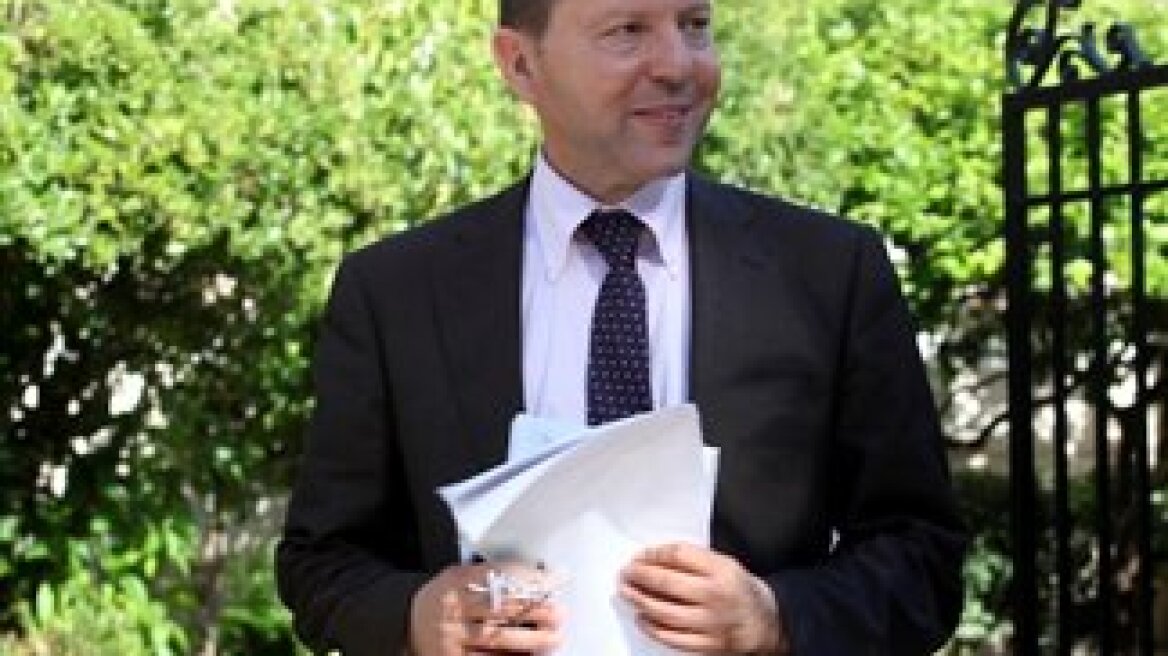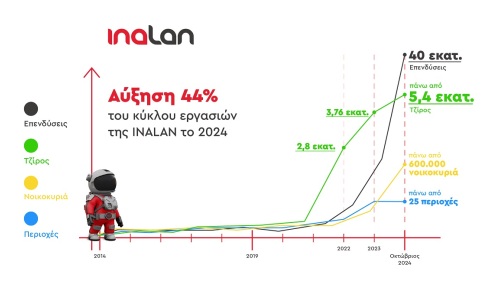
Stournaras’ first crash test with the Troika
Stournaras’ first crash test with the Troika
Like all the finance ministers of the South, the new head of the Greek economic staff has many major problems. Already, John Stournaras is counting the remaining hours until the plane which will carry the three Troika heads lands at Eleftherios Venizelos.

UPD:
Like all the finance ministers of the South, the new head of the Greek
economic staff has many major problems. Already, John Stournaras is
counting the remaining hours until the plane which will carry the three
Troika heads lands at Eleftherios Venizelos.
Thomsen, Masuch and Morse are arriving in Athens for a difficult meeting with the economic team.
Yannis Stournaras is emphatic when he speaks of the coming difficult months: "We have the potential to escape from the problem," he said yesterday afternoon and noted that two days after the June 17 elections and the formation of new government, about 2 billion euros returned to the banking system. "There is a wall of incumbent attitudes that do not want to hear that Greece has potential," he added.
The economy has been in recession for 4 years in a row (in the third quarter it will exceed 9%), state funds have only 2 billion for salaries and pensions, hospitals have no materials for surgeries, insurance funds such as Social Security need additional financing, tax authorities do not collect taxes, banks are under great pressure, the French of Emporiki Bank and General Bank are ready to leave the country, while ATE and TT, which employ 10,000 people, need money immediately for their recapitalization.
To meet some of its needs the State proceeded to issuing two quarterly Treasury bills of 1.6 billion and 1 billion euros. 400 million will cover current needs and namely the debts of hospitals to suppliers and of Funds to pharmacists, while 1.2 billion was allocated to cover maturities of past bills. The remaining 1 billion will be used to fund other State needs. As one can understand, the State simply took a "breather" but at a high rate (4.60%).
During their first meeting, the economy team will discuss the following with the Troika:
Thomsen, Masuch and Morse are arriving in Athens for a difficult meeting with the economic team.
Yannis Stournaras is emphatic when he speaks of the coming difficult months: "We have the potential to escape from the problem," he said yesterday afternoon and noted that two days after the June 17 elections and the formation of new government, about 2 billion euros returned to the banking system. "There is a wall of incumbent attitudes that do not want to hear that Greece has potential," he added.
The economy has been in recession for 4 years in a row (in the third quarter it will exceed 9%), state funds have only 2 billion for salaries and pensions, hospitals have no materials for surgeries, insurance funds such as Social Security need additional financing, tax authorities do not collect taxes, banks are under great pressure, the French of Emporiki Bank and General Bank are ready to leave the country, while ATE and TT, which employ 10,000 people, need money immediately for their recapitalization.
To meet some of its needs the State proceeded to issuing two quarterly Treasury bills of 1.6 billion and 1 billion euros. 400 million will cover current needs and namely the debts of hospitals to suppliers and of Funds to pharmacists, while 1.2 billion was allocated to cover maturities of past bills. The remaining 1 billion will be used to fund other State needs. As one can understand, the State simply took a "breather" but at a high rate (4.60%).
During their first meeting, the economy team will discuss the following with the Troika:
- The 5 billion for the next tranche and the recapitalization timetable for the 4 major banks (National, Eurobank, Piraeus Bank, Alpha Bank), totaling 25 billion euros.
This means that the money of the next recapitalization should come to Athens in the coming months. The markets, however, must know now when this will happen as the Greek banks are under pressure. The cases of ATE and TT, which employ over 10,000 workers, are still pending. Most likely they will be converted into a bridge bank.
- Revenues: There is a shortfall of about 900 million euros in the first five months of the year, since the tax authorities do not collect taxes. According to unofficial data only 2 in 10 people pay their taxes.
- State debts to businesses, which amount to 6.4 billion euros, and hundreds of businesses have not been paid for months.
- Privatizations. Due to the successive elections the State froze the privatizations processes. The projects that need to be completed immediately are Elliniko, DEPA-DESFA etc.
- Pension Funds: The primary surplus of insurance funds (after the cuts to pensions and benefits) dissipated to the point that some Funds, and especially hospitals, had to proceed to an undeclared "default" in the last two months.
- Tax evasion. IMF chief Christine Lagarde has said that the rich in Greece do not pay at all, unlike the middle class that pays all the taxes.
One of the key outstanding issues that the new minister will have to work towards is the technological modernization of public administration. Despite assurances about the opposite, most public services are still under contract and stuck for months in the bidding process or at best, they have entered a pilot phase.
Renegotiation
The renegotiation of the memorandum will be the central issue raised by the new minister to the Troika people. Of course this is an issue upon which only State leaders of the Eurozone can decide and therefore Thomsen, Masuch and Morse will not be able to discuss it officially.
The payment of 90 billion euros from the support mechanism until 2014 remains unresolved, with the European Commission warning that a prerequisite for the release of each tranche is the fulfillment of commitments to implement the agreed measures.
The total amount of the loan support program of Greece in 2010-2014 amounts to 237.5 billion euros. Its disbursement is as follows:
- 38 bil. euros in 2010
- 35 bil. euros in 2011
- 74.5 bil. euros in January-May 2012
The payment of the 90 billion euros until 2014 will be as follows:
- 45.9 billion by the end of 2012, of which 23.8 will be used to complete the recapitalization of the banks until the autumn that will cost a total of 48.8 billion euros. The remaining 22.1 billion will be allocated to cover the cash deficit of the budget and repayments of bonds which had not joined the PSI.
- 22.7 bil. in 2913
- 21.4 in 2014
Greece is not scheduled to receive any loans from the support mechanism in 2015.
Front-page attack by "Avgi"
Through today's attack to Yiannis Stournaras in the "Avgi" newspaper, the SYRIZA leadership sends the first message to the new minister, whom they call as a "Minister of recessions and divestitures," a representative of Troika and the industrialists and a proponent of the memorandum and privatizations.
The article reflects the hard attitude that will be displayed by SYRIZA against the leader of the Greek economy, whom they have assessed negatively since the first few hours of him assuming his duties.
"Avgi" reveals that Stournaras already presented the plan of privatizations in our country three months ago in cooperation with Stefanos Manos through the "Archimedes Project", which involved the privatization of airports, harbors and real estate of the Greek State.
This means that the money of the next recapitalization should come to Athens in the coming months. The markets, however, must know now when this will happen as the Greek banks are under pressure. The cases of ATE and TT, which employ over 10,000 workers, are still pending. Most likely they will be converted into a bridge bank.
- Revenues: There is a shortfall of about 900 million euros in the first five months of the year, since the tax authorities do not collect taxes. According to unofficial data only 2 in 10 people pay their taxes.
- State debts to businesses, which amount to 6.4 billion euros, and hundreds of businesses have not been paid for months.
- Privatizations. Due to the successive elections the State froze the privatizations processes. The projects that need to be completed immediately are Elliniko, DEPA-DESFA etc.
- Pension Funds: The primary surplus of insurance funds (after the cuts to pensions and benefits) dissipated to the point that some Funds, and especially hospitals, had to proceed to an undeclared "default" in the last two months.
- Tax evasion. IMF chief Christine Lagarde has said that the rich in Greece do not pay at all, unlike the middle class that pays all the taxes.
One of the key outstanding issues that the new minister will have to work towards is the technological modernization of public administration. Despite assurances about the opposite, most public services are still under contract and stuck for months in the bidding process or at best, they have entered a pilot phase.
Renegotiation
The renegotiation of the memorandum will be the central issue raised by the new minister to the Troika people. Of course this is an issue upon which only State leaders of the Eurozone can decide and therefore Thomsen, Masuch and Morse will not be able to discuss it officially.
The payment of 90 billion euros from the support mechanism until 2014 remains unresolved, with the European Commission warning that a prerequisite for the release of each tranche is the fulfillment of commitments to implement the agreed measures.
The total amount of the loan support program of Greece in 2010-2014 amounts to 237.5 billion euros. Its disbursement is as follows:
- 38 bil. euros in 2010
- 35 bil. euros in 2011
- 74.5 bil. euros in January-May 2012
The payment of the 90 billion euros until 2014 will be as follows:
- 45.9 billion by the end of 2012, of which 23.8 will be used to complete the recapitalization of the banks until the autumn that will cost a total of 48.8 billion euros. The remaining 22.1 billion will be allocated to cover the cash deficit of the budget and repayments of bonds which had not joined the PSI.
- 22.7 bil. in 2913
- 21.4 in 2014
Greece is not scheduled to receive any loans from the support mechanism in 2015.
Front-page attack by "Avgi"
Through today's attack to Yiannis Stournaras in the "Avgi" newspaper, the SYRIZA leadership sends the first message to the new minister, whom they call as a "Minister of recessions and divestitures," a representative of Troika and the industrialists and a proponent of the memorandum and privatizations.
The article reflects the hard attitude that will be displayed by SYRIZA against the leader of the Greek economy, whom they have assessed negatively since the first few hours of him assuming his duties.
"Avgi" reveals that Stournaras already presented the plan of privatizations in our country three months ago in cooperation with Stefanos Manos through the "Archimedes Project", which involved the privatization of airports, harbors and real estate of the Greek State.
UPD:
Ακολουθήστε το protothema.gr στο Google News και μάθετε πρώτοι όλες τις ειδήσεις
Δείτε όλες τις τελευταίες Ειδήσεις από την Ελλάδα και τον Κόσμο, τη στιγμή που συμβαίνουν, στο Protothema.gr
Δείτε όλες τις τελευταίες Ειδήσεις από την Ελλάδα και τον Κόσμο, τη στιγμή που συμβαίνουν, στο Protothema.gr
ΡΟΗ ΕΙΔΗΣΕΩΝ
Ειδήσεις
Δημοφιλή
Σχολιασμένα






































